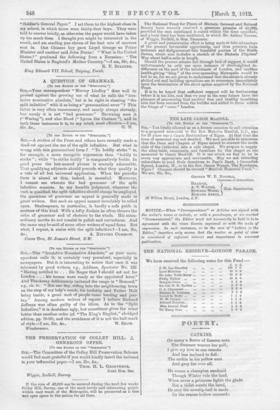[TO THE EDITOR OF THE "srsorsrea."] Ssn,—A section of the
Press and others have recently made a dead-set against the use of the split infinitive. Bat what is wrong with this grammatical form ? "To boldly strike" is, for example, a more energetic expression than 'boldly to strike " ; while "to strike boldly" is comparatively feeble. In good prose the last-named phrase is scarcely admissible. That qualifying adjuncts should precede what they qualify is a rule of all but universal application. When the periodic form is aimed at this, indeed, is essential. Moreover, I cannot see wherein the bad grammar of the split infinitive consists. In my humble judgment, wherever the verb is qualified, the split infinitive should always be employed. On questions of grammar an appeal is generally made to great writers. But such an appeal cannot invariably be relied upon. Shakespeare, in particular, is hardly a safe guide in matters of this kind. With a lofty disdain he often throws the rules of grammar and of rhetoric to the winds. His extra- ordinary merits do not consist in polish and correctness. And the same may be said of some other writers of equal fame. But
what, I repeat, is amiss with the split infinitive am, Sir, Cocoa Tree, St. James's Street, S. W.










































 Previous page
Previous page